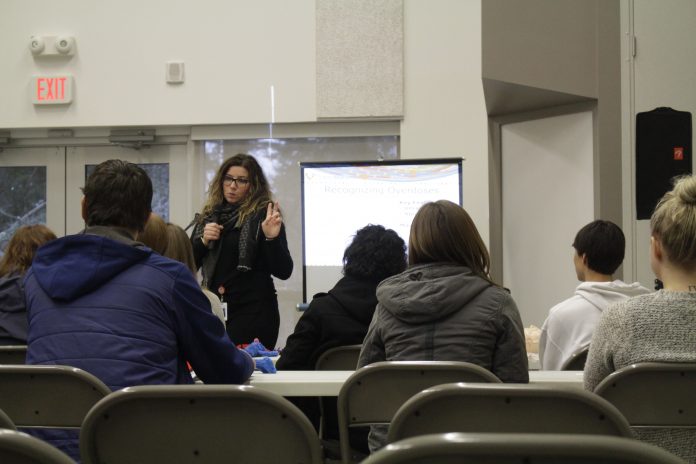With B.C.’s fentanyl crisis still going strong, the future of opiate overdoses in the province is looking bleak. But students in UFV professor Robert Harding’s Social Work and Community Development class are working to change that.
On Thursday, students in the class hosted a Harm Reduction & Naloxone Training event which featured speakers, along with naloxone administration training.
“It’s to start a conversation on harm reduction because of the drug opiate crisis,” Chloe Smith, a student in the class, said. “We decided to focus on harm reduction because of the fentanyl crisis and everything going on right now.”
The event was organized as a group assignment for the 300-level course, which there are two of offered this semester. Each class was split into two groups of about 15 students, and each was responsible for creating a community development initiative.
“Our professor quotes Saul Alinsky who’s a big community developer using activism, and he said that community development learning can’t solely take place in the classroom, it needs to actually happen through doing community development,” Smith said. “What we saw as a big community issue right now is the drug crisis. We wanted to create some education around people understanding what’s going on and also what they can do to help too.”
The event began with speakers, including Erica Thomson, a former user and HIV / hepatitis C outreach worker at the warm zone, a drop-in centre for street-engaged and vulnerable women in Abbotsford and Mission, as well as Erin Gibson, Fraser Health’s harm reduction coordinator.
Following the speakers, attendees had the opportunity to speak with Thomson, as well as workers and service users from Rain City Housing, or complete naloxone training with Gibson and a public health nurse.
“A lot of people want to take action, so that’s why we have the training piece, so that if someone sees someone overdosing they can use naloxone to reverse the opiate overdose,” Smith said.
The fentanyl crisis saw 914 overdose-caused deaths in B.C. last year, an 80 per cent increase from 2015. A report released by the B.C. Coroners Service on Friday showed that in February alone, 102 people died of suspected drug overdose in the province.
While Smith and her group mates are hoping to increase education surrounding drug use and the ongoing crisis, they’re also hoping to increase empathy for it as well.
“Either people aren’t totally aware of it, or they’re becoming more aware of it but they don’t necessarily understand it from a user perspective. We’re trying to bring that piece here to help people have empathy and more understanding,” she said. “I think empathy, along with education, is what changes people’s minds.”
Although the majority of students involved in the project and in the class are social work and global development students, the event was open to not only all UFV students, but community members as well.
“We’re hoping community members, and even people with maybe not the greatest understanding or opposition opinions, will come and have their minds open and understand,” Smith said. “[We want to] make people feel like they can make a difference and that they have a greater understanding of what’s going on right now.”


